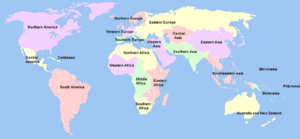Category:West Asian: Difference between revisions
From All Skies Encyclopaedia
No edit summary |
No edit summary |
||
| (2 intermediate revisions by the same user not shown) | |||
| Line 1: | Line 1: | ||
[[File: |
[[File:United Nations geographical subregions.png|alt=UN geoscheme.|thumb|UN geoscheme (CC BY Ben Arnold, E Pluribus Anthony). West Asia is purple.]] |
||
The geoscheme of the United Nations (UN) subdivides Asia into the subregions: Eastern Asia, Central Asia, South Asia, Southeast Asia, Western Asia, Russia (Asia) commonly called Siberia (because Siberia is defined as the Asian part of Russia). |
The geoscheme of the United Nations (UN) subdivides Asia into the subregions: Eastern Asia, Central Asia, South Asia, Southeast Asia, Western Asia, Russia (Asia) commonly called Siberia (because Siberia is defined as the Asian part of Russia). |
||
West Asia is culturally dominated by the Mesopotamian and partially by the Persian culture(s). However, continuous exchange with South European cultures in the north and with the Egyptian culture in the southwest strongly influenced all developments. |
West Asia is culturally dominated by the Mesopotamian and partially by the Persian culture(s). However, continuous exchange with South European cultures in the north and with the Egyptian culture in the southwest strongly influenced all developments. |
||
[[Category:Eurasia]] |
|||
Latest revision as of 10:43, 6 March 2024
The geoscheme of the United Nations (UN) subdivides Asia into the subregions: Eastern Asia, Central Asia, South Asia, Southeast Asia, Western Asia, Russia (Asia) commonly called Siberia (because Siberia is defined as the Asian part of Russia).
West Asia is culturally dominated by the Mesopotamian and partially by the Persian culture(s). However, continuous exchange with South European cultures in the north and with the Egyptian culture in the southwest strongly influenced all developments.
Subcategories
This category has the following 4 subcategories, out of 4 total.
Pages in category "West Asian"
The following 200 pages are in this category, out of 472 total.
(previous page) (next page)A
- A-ḫa-ti
- A.EDIN
- A.GI7
- A2.GU2.ZI.GA 𒀉𒄘𒍣𒂵
- AB.SIN2, ABSIN (𒀊𒉆)
- AD6
- AG2.AN.BUR2
- AGA
- AGA A-nim
- Agru
- AKKIL
- al-Suʿūd ()
- al-Ḫibā’(الخِباء)
- AL.LUL
- ALAM
- AL.LUL
- Alsephina
- Alwaid (العَوائِذ)
- mulAM.AN.NA
- AMA.ME.TIL
- AMAR.UTU
- Amurru
- AN
- mulAN.TA.GUB
- AN.TA.ŠU.UR.RA
- mulAN.U2.GI.E
- Andromeda
- Antares
- Anunītu
- ANŠE.KUR.RA
- mulAPIN
- Aquarius
- Aquila
- Ara
- Arabic (All Terms)
- Arcturus (Ἀρκτοῦρος)
- Aries
- Arītum
- Arḫum
- Asīdu
- Auriga
- AŠ.ME
- AḪUD





